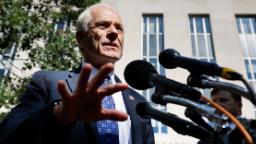[ad_1]

CNN
—
A federal judge declined Thursday to dismiss the criminal contempt of Congress charges brought against former Trump White House adviser Peter Navarro for his failure to comply with a subpoena from the House select committee that investigated the January 6, 2021, attack on the US Capitol.
In his opinion, US District Judge Amit Mehta dismantled a wide variety of arguments that Navarro had brought trying to get the case thrown out. Mehta’s decision clears the way for the contempt of Congress case – the second such prosecution that the Department of Justice has brought stemming from the now-defunct House January 6 probe – to go to trial at the end of the month.
Mehta wrote that Navarro had failed to provide sufficient evidence to support his claim that former President Donald Trump had asserted privilege over the documents and testimony the House January 6 committee was seeking.
“[Navarro] has offered neither a sworn affidavit nor testimony from him or the former President. His contention rests only on his counsel’s representations, which are not evidence,” Mehta wrote. “Without actual proof, the court cannot find that there was a formal invocation of privilege by the former President.”
The judge was also not persuaded by Navarro’s arguments that the January 6 committee should have reached out to Trump to settle privilege concerns.
“The court cannot dismiss an indictment for contempt of Congress on the mere presumption that President Trump would have asserted executive privilege if only he had been asked,” he wrote.
Mehta rejected Navarro’s assertions that the committee was procedurally flawed in a way that should allow him to avoid prosecution. Mehta was also unconvinced by Navarro’s claims that he was the target of selective prosecution. The other ex-Trump aides Navarro pointed to – former White House officials Mark Meadows and Dan Scavino, whom the DOJ declined to charge – engaged at length with the committee before not complying with its subpoenas in the investigation, Mehta noted, and they also received written instructions from Trump’s lawyers raising privilege concerns.
“These interactions with the Select Committee stand in contrast to those of Defendant, who communicated with the Select Committee over a three-week period largely through terse emails and public statements,” the judge wrote.
The committee was disbanded with the GOP takeover of the House, and it wrapped up its work with a report released at the end of last year. However, the dissolution of the committee does not affect the DOJ’s criminal prosecution of Navarro, and his trial is scheduled to begin January 30.
Mehta’s opinion also resolved some disputes over what defenses Navarro can present at trial, with the judge – an Obama appointee – accepting several of the Justice Department’s arguments that will constrain what evidence Navarro will be allowed to offer to the jury.
The Justice Department was similarly successful in limiting the defenses that Steve Bannon – a Trump ally who was also prosecuted for not complying with a House January 6 committee subpoena – was allowed to put on at his trial last year. A jury convicted Bannon, and he is now appealing the case.
Source link



